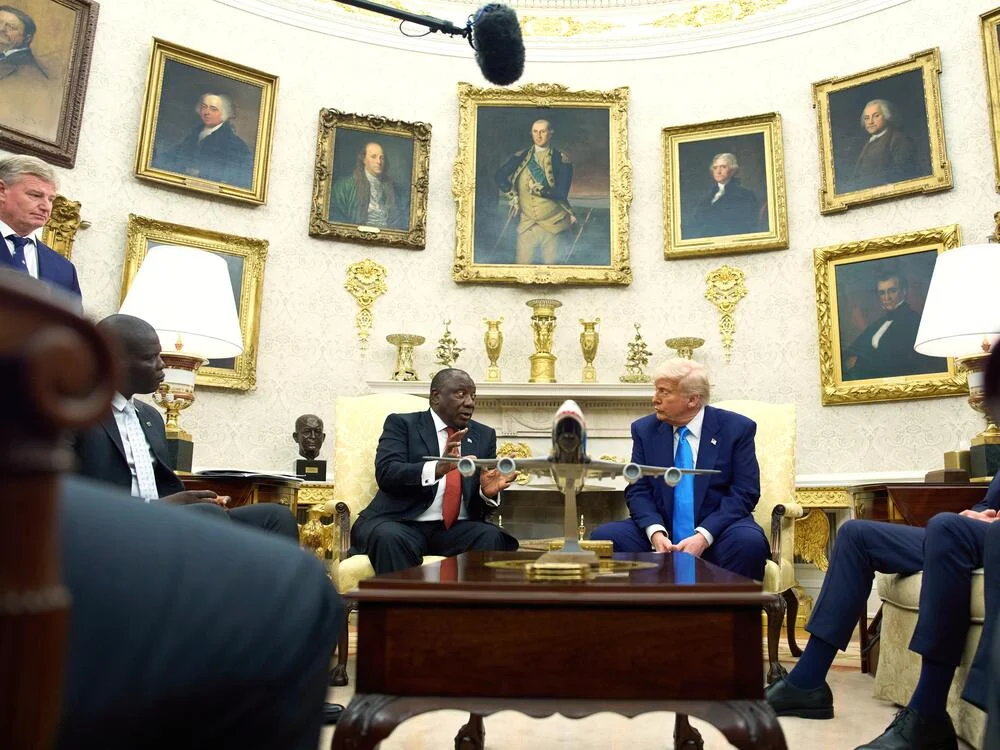What was meant to be a diplomatic effort to mend strained relations between the United States and South Africa quickly descended into a spectacle of political confrontation. During a joint press conference at the White House, former U.S. President Donald Trump blindsided South African President Cyril Ramaphosa with provocative allegations of a so-called “genocide” targeting white farmers in South Africa—claims long discredited by independent observers and judicial authorities.
Trump’s theatrical use of misleading video footage and inflammatory language turned a diplomatic meeting into a media ambush. While the moment drew international attention for its shock value, it also invites deeper reflection: What were Trump’s real motivations? Was he expressing genuine concern for Afrikaners, perhaps influenced by his admiration for Elon Musk, a white South African by origin? Or was this a calculated move to publicly shame a country that dared to challenge Israel at the International Court of Justice?

White Refugees and Political Symbolism
Just days before Ramaphosa’s visit, the U.S. granted asylum to 59 white South Africans, mostly Afrikaners. Officially framed as a humanitarian gesture, the move was widely interpreted in South Africa as a political message, timed to signal support for the white minority and to provoke Pretoria.
Trump’s insistence on raising the issue of “white genocide”—a narrative popular among far-right circles—ignored the country’s official crime statistics, which show that the vast majority of violent crime victims are Black South Africans. Nevertheless, Trump chose to resurface this debunked narrative in full view of the global press, weaponizing misinformation to undermine the South African president.
A Diplomatic Trap?
According to several analysts, including former U.S. Ambassador to South Africa Patrick Gaspard, the meeting bore the marks of a carefully orchestrated trap. Gaspard described the encounter as “humiliating” and accused the Trump administration of deliberately seeking to embarrass Ramaphosa on the world stage.
The broader political context sheds light on Trump’s possible motives. South Africa has taken a leading role in international efforts to hold Israel accountable for alleged war crimes, filing a genocide case before the ICJ. For Trump—a staunch supporter of Israel—this legal challenge may have constituted a geopolitical affront. What emerged at the White House, then, was not a genuine conversation about human rights, but a retaliatory spectacle designed to punish South Africa for its defiance.
The Musk Connection?
Some observers have pointed to Elon Musk’s possible influence, or at least symbolic presence, in Trump’s actions. Musk, who was born and raised in South Africa, has occasionally expressed concern about the future of the white minority in his country of origin. As Trump cultivates a public friendship with Musk, one might ask whether his sudden concern for Afrikaners is coincidental—or part of a larger political alignment with right-leaning, tech-savvy elites.
While no direct evidence links Musk to the White House incident, the convergence of interests and narratives is hard to ignore.
Land Reform and the Politics of Sovereignty
Central to Trump’s grievances is South Africa’s controversial land reform policy, signed into law earlier this year. The legislation permits land expropriation without compensation under specific conditions—a measure aimed at correcting historical injustices rooted in apartheid-era land dispossession.
For Trump and many of his political allies, such reforms threaten the sanctity of private property, a cornerstone of Western capitalist ideology. But in the South African context, this policy is about more than economics—it is a matter of justice, sovereignty, and national healing.
Trump’s attack on South Africa’s land reform thus appears less as a principled stand for human rights, and more as an ideological reaction against post-colonial states reclaiming control over their destinies.
Conclusion: Neo-Colonialism in the Guise of Advocacy
The White House confrontation was not merely about the safety of white farmers—it was about power, race, and international justice. In confronting Ramaphosa so aggressively, Trump sent a clear message to other nations in the Global South: challenging the geopolitical status quo comes at a price.
South Africa’s sin, in the eyes of Trump, was its moral and legal commitment to defending Palestinian rights and redistributing wealth to correct racial inequities. By reviving tired colonial tropes of “white victimhood in Black Africa,” Trump sought to undermine Pretoria’s international credibility and internal reforms.
This episode serves as a potent reminder: in today’s global politics, human rights can be invoked not only to protect the vulnerable—but also to disguise efforts to uphold old hierarchies.
By Belgacem Merbah
Comments
Post a Comment